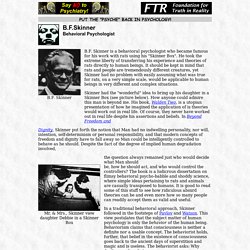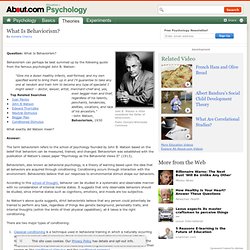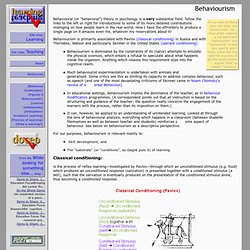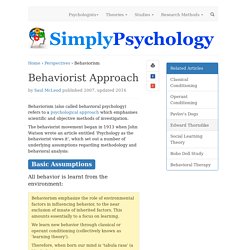

Use a Learning Theory: Behaviorism. Behaviorism, B.F. Skinner, Social Control, Modern Psychology, Man as Machine, and Denial of Man's Mind and Soul. Dignity, Skinner put forth the notion that Man had no indwelling personality, nor will, intention, self-determinism or personal responsibility, and that modern concepts of freedom and dignity have to fall away so Man could be intelligently controlled to behave as he should.

Despite the fact of the degree of implied human degradation involved, observe the real field of psychology? Let us limit ourselves to things that can be observed, and formulate laws concerning only those things. Now what can we observe? We can observe behavior - what the organism does. The rule, or measuring rod, which the behaviorist puts in front of him always is: Can I describe this bit of behavior I see in terms of "stimulus and response"? The interest of the behaviorist in man's doings is more than the interest of the spectator - he wants to control man's reactions as physical scientists want to control and manipulate other natural phenomena. He states in Beyond Freedom and Dignity: The Skinner Box. GSI Teaching & Resource Center. Behaviorist teaching methods have proven most successful in areas where there is a “correct” response or easily memorized material.

BackgroundView of KnowledgeView of LearningView of MotivationImplications for Teaching Background Methodological behaviorism began as a reaction against the introspective psychology that dominated the late 19th and early 20th centuries. Introspective psychologists such as Wilhelm Wundt maintained that the study of consciousness was the primary object of psychology. Their methodology was primarily introspective, relying heavily on first-person reports of sensations and the constituents of immediate experiences. The mentalistic problem can be avoided by going directly to the prior physical causes while bypassing intermediate feelings or states of mind.
Radical behaviorists such as Skinner also made the ontological claim that facts about mental states are reducible to facts about behavioral dispositions. Behaviorism. Behavioral theories define learning as a "semi-permanent change in behavior.

" In other words, learning has only taken place if a change in behavior is evident. Pure behaviorists are not concerned with internal process, but with external exibitions. There are two main theories involved: Classical conditioning and operant conditioning. Classical conditioning hearkens back to Pavlov's experiment with his salivating dogs. It's basic premise is that behaviors can be conditioned by pairing stimuli with responses. Another type of behaviorism is operant conditioning, which involves the use of reinforcement to encourage behaviors. The key thing to remember in this section is that, in Educational Psychology, we are concerned with the use of behavioral methods to encourage learning rather than for classroom or behavior management.
Key Questions to Ask About Behaviorism: What are the basic assumptions underlying behavioral theories? Example from the classroom: Kelly and Susan Adams. GSI Teaching & Resource Center. What Is Behaviorism? How It Works and How It Influenced Psychology. Question: What Is Behaviorism?

Behaviorism can perhaps be best summed up by the following quote from the famous psychologist John B. Watson: "Give me a dozen healthy infants, well-formed, and my own specified world to bring them up in and I'll guarantee to take any one at random and train him to become any type of specialist I might select -- doctor, lawyer, artist, merchant-chief and, yes, even beggar-man and thief, regardless of his talents, penchants, tendencies, abilities, vocations, and race of his ancestors. " --John Watson, Behaviorism, 1930 What exactly did Watson mean? Answer: The term behaviorism refers to the school of psychology founded by John B. Behaviourism. If you want to follow your own links, use "behaviorism" (sic.)

Most of the material is US-based and "behaviorism" and "behaviorist" is how they spell it, and I freely admit that this side-bar is purely to get the stupid search engine "bots" to register "behavior" Behavioural (or "behavioral") theory in psychology is a very substantial field: follow the links to the left or right for introductions to some of its more detailed contributions impinging on how people learn in the real world.
How I have the effrontery to produce a single page on it amazes even me, whatever my reservations about it! Behaviourism is primarily associated with Pavlov (classical conditioning) in Russia and with Thorndike, Watson and particularly Skinner in the United States (operant conditioning). Behaviourism is dominated by the constraints of its (naïve) attempts to emulate the physical sciences, which entails a refusal to speculate about what happens inside the organism. Classical conditioning: Notes. Behaviorism. By Saul McLeod published 2007, updated 2016 Behaviorism (also called behavioral psychology) refers to a psychological approach which emphasises scientific and objective methods of investigation.

The behaviorist movement began in 1913 when John Watson wrote an article entitled 'Psychology as the behaviorist views it', which set out a number of underlying assumptions regarding methodology and behavioral analysis: Basic Assumptions All behavior is learnt from the environment: Behaviorism emphasize the role of environmental factors in influencing behavior, to the near exclusion of innate of inherited factors. We learn new behavior through classical or operant conditioning (collectively known as 'learning theory'). Therefore, when born our mind is 'tabula rasa' (a blank slate).